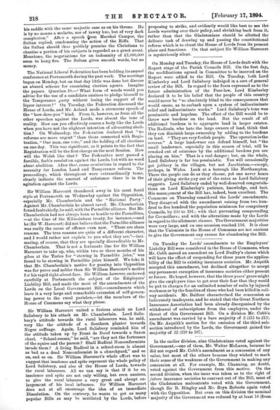Sir William Harcourt thundered away in his most florid style
at Portsmouth on Wednesday against the Opposition, especially Mr. Chamberlain and the "National Party." Against Mr. Chamberlain he almost raved. Mr. Chamberlain found fault chiefly, he said, with the Parnellite alliance. But Mr. Chamberlain had not always been so hostile to the Parnellites, —at the time of the Kilmainham treaty, for instance,—and he (Sir W. Harcourt) did not believe that the Parnellite alliance was really the cause of offence even now. "These are sham reasons. The true reasons are quite of a different character, and I would rather not explain to you what they are,"—inti- mating, of course, that they are specially discreditable to Mr. Chamberlain. That is not a fortunate line for Sir William Harcourt to take up, who, within two or three months of his gibes at the Tories for "stewing in Parnellite juice," was found to be stewing in Parnellite juice himself. We take it that Mr. Chamberlain's motive for passing into Opposition was far purer and nobler than Sir William Harcourt's motive for his rapid right-about-face. Sir William, however, eschewed carefully at Portsmouth the subject of the Eibployers' Liability Bill, and made the most of the amendments of the Lords on the Local Government Bill,—amendments which leave it a very large and remarkable extension of self-govern- ing power to the rural parishes,—let the members of the House of Commons say what they please.






































 Previous page
Previous page